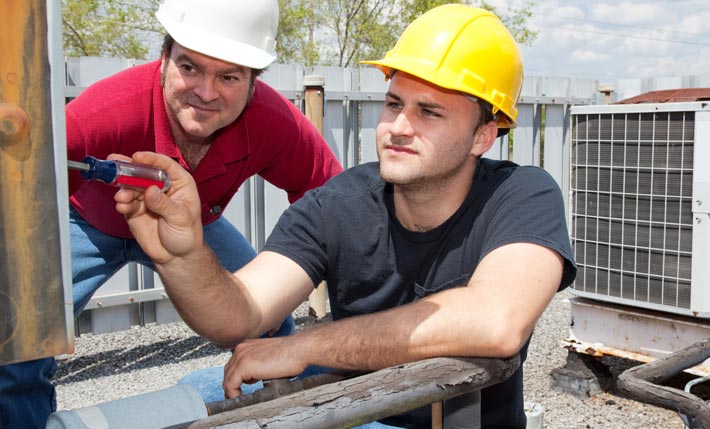Learn more about becoming an HVAC Technician
People would not have the comfort of heat and air conditioning in their homes and businesses if it wasn’t for HVAC systems and the trained professionals who install, inspect and maintain them. As HVAC systems become more complex, the need for HVAC technicians is projected to grow by 15 percent from 2016 through 2026, more than double the average growth rate for all occupations, according to the Bureau of Labor Statistics.
Dawn Career Institute recently added the HVAC Technician program to provide hands-on training for this growing career.
What is an HVAC Technician?
HVAC stands for heating, ventilation and air conditioning. HVAC systems help control the temperature, humidity and overall air quality in a room or building. Technicians clean, inspect and maintain these systems – and repair them when problems arise. They also update customers on their systems’ statuses so they can feel confident everything is working properly.
Daily Routine
The daily routine of an HVAC technician varies depending on his or her employment and the company. Technicians typically start their day by looking at their schedule to see what customers they will be servicing. The day can include working on one site or traveling to several locations making service calls. The number of appointments per day varies depending on customers’ needs. Some appointments might be an easy and quick fix while others may take longer to complete.
General tasks can include installing new products, troubleshooting and repairing a broken system, and evaluating the health of the system. Maintenance checks are vital to maintain an up-to-date HVAC system and provide a long shelf life. Before the winter and summer season, HVAC technicians will see a spike in maintenance calls.
Work Environment
Heating and cooling systems are found everywhere, so an HVAC technician can work anywhere from homes, schools, hospitals, office buildings and factories. Technicians work mostly indoors, but sometimes must service outdoor systems in all types of weather. Sometimes, HVAC technicians might need to fit into small and tight spaces to repair parts.
Most HVAC technicians work regular full-time hours, but sometimes emergency calls require overtime.
Education
Dawn Career Institute believes in combining qualified instructors with the equipment and tools graduates will use in most HVAC technician jobs. The hands-on training program will provide valuable training that includes:
- HVAC Electrical Systems and Circuits
- HVAC Mechanical Systems and Motors
- Field Operations
- Automatic Control Systems
- Electric Gas and Heat
- Oil- and Water-Based Heating Systems
- Air Conditioning and Heat Pumps
- Refrigeration Concepts
- Soft Skills
Are you ready to start the journey to becoming an HVAC technician? Our team is ready to help. Visit our website or contact us at 800-490-9135 to schedule a tour.





